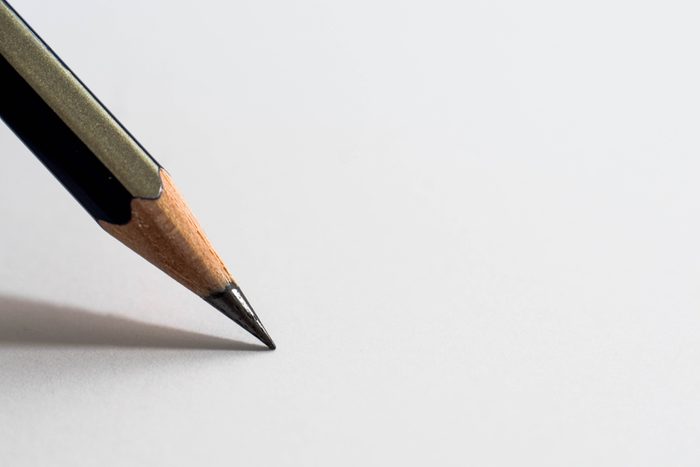
Use a pencil
Ever seen a crossword grid with thick pen marks darkening over a wrong letter? Doing a crossword puzzle in pen means you have confidence in always being right. But even easy puzzles can throw you a curve ball, so you might as well use a pencil and challenge yourself by trying not to use the eraser. (It usually smudges newsprint, anyway.) Even better, you can work off of an app or the web. Some crossword puzzle apps include features like auto check and clue reveals to give you a helping hand. You can even choose a pen or pencil and the graphic will look softer like lead or dark and permanent like ink. Try your hand at solving the world’s first crossword puzzle.
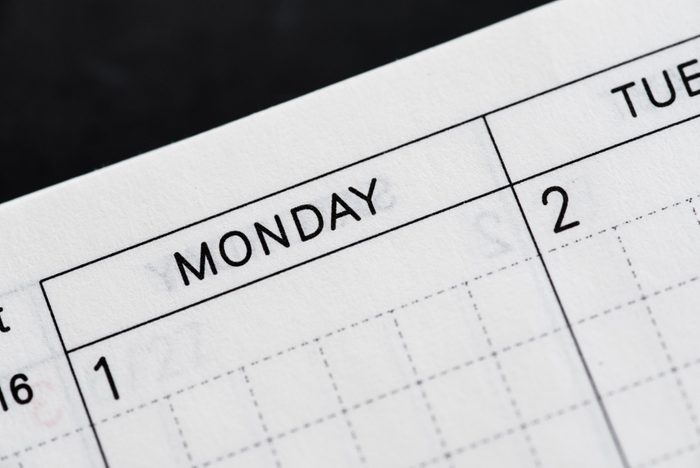
Start with Monday puzzles
You can gauge the difficulty of a crossword puzzle by the weekday when it’s published. Traditionally, Monday puzzles are constructed to be easy and breezy, making them a great entry point for new solvers. Puzzles get more challenging as the week moves along. By the time you get to Wednesday, you can “do something that requires a little bit extra from the solver,” says Brendan Emmett Quigley, a master crossword puzzle constructor who has constructed for major outlets including the famed New York Times crossword. Friday and Saturday puzzles (in most newspapers) are considered the most challenging days. That’s when you’ll find long, marquee answers moving across the grid and more inventive, challenging clues. Check out these simple brain games that actually make you feel happier.
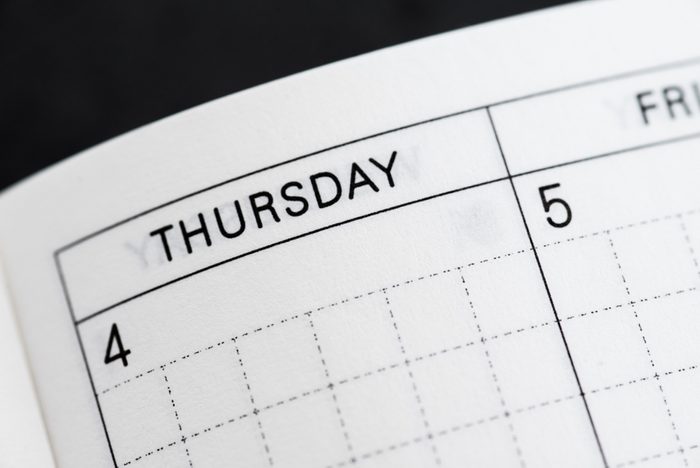
Thursday puzzles are usually themed
Thursday crossword puzzles usually have a theme that asks a lot of the solver. Quigley explains a crossword puzzle theme as “the linking element that combines all the pieces of the puzzle—all the long answers.” The theme can comprise a category, a pun, or a manipulation of the answers that add or remove a component. The theme can also use a rebus—that’s when several letters are used in one square that work both across and down. As one category example, Quigley points out answers that all start with a part of a bicycle. Answers will be, “chain of fools, pedal pushers, handlebar mustache, things like that,” he explains. Whatever the theme, you can expect to spend more time on the puzzle because it’s more demanding to figure it out. Check out the tombstone that contained a cryptic crossword puzzle.

Pay attention to the format of the clue
One of the best tips for solving crossword puzzles is to consider the format of the clue. What verb tense is it in? Is it plural? Does it use slang? Is in quotations? What part of speech is it? The answer will always be in the same form as the clue. For example, if the answer is a verb, you can often work on the ending first. Ask yourself if an “ed” or “ing” fits. If the clue uses informal language, so will the answer. And if the clue uses an abbreviation, the answer is looking for that form as well.
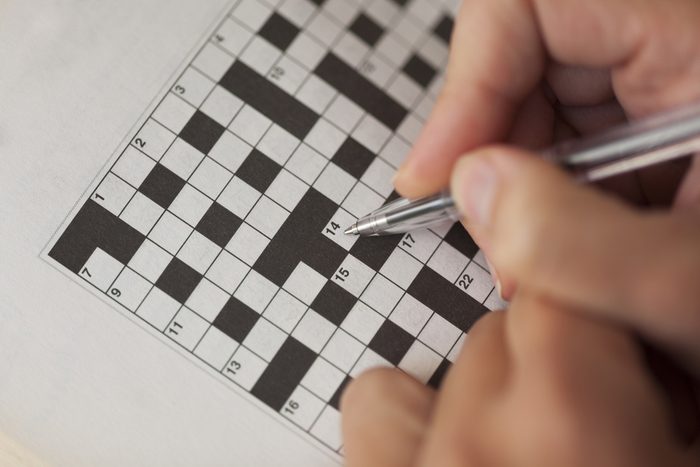
Do a quick first run
Challenging puzzles can seem impenetrable, but you can usually get at least one answer off the bat. Start your puzzle by doing a quick run through of the across clues and fill in any “gimmies.” Those are the easy answers that you can find quickly off the top of your head. Do a similar run-through with the down clues. Then take a look and see what you’ve got to work with.
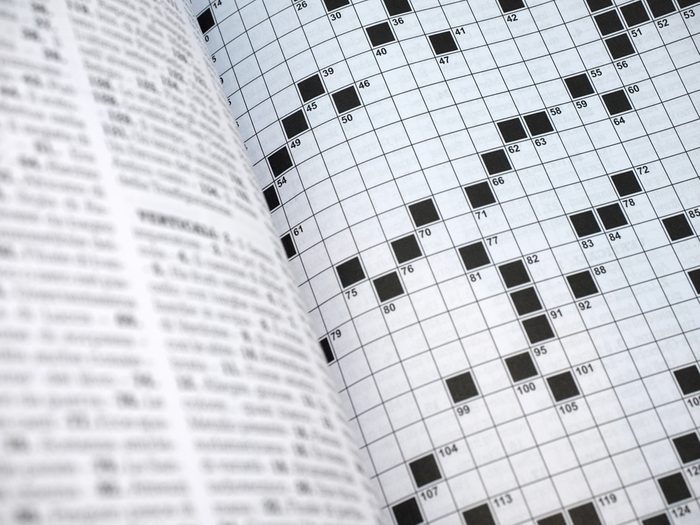
Work with the intersections
One of the best aspects of solving crossword puzzles are all the options; you’re never just working with one clue and one answer. You’re working with a system of interlocking and interdependent answers with crossings and intersections. If the down clue seems impossible, give it a try by looking at the answers that cross it. Work one section or corner at a time. Sometimes getting a single letter can help you bust through an impasse.
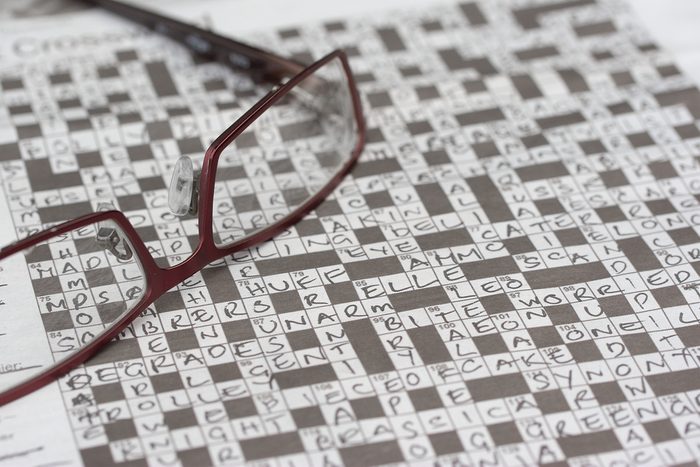
Use your natural wits
While crossword puzzles do have their own language—and many of the same words will appear over and over—you can use your own expertise to your advantage. You’ll probably come across answers related to baseball, opera, geography, literature, and pop culture. The fun part is retrieving that little-known piece of trivia from your own mind and plugging it into the grid. Don’t miss these brain games guaranteed to boost your brainpower.
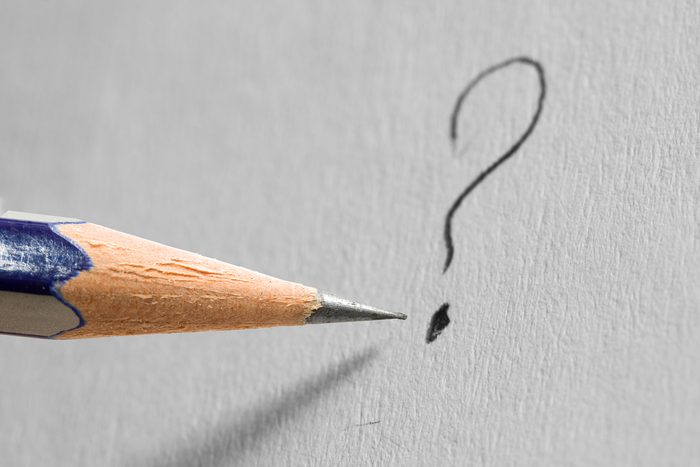
Pay attention to question marks
When you see a question mark, that’s your signal to consider a pun or a misdirection as the answer. One recent Friday puzzle used the clue “Wasted vacation days?” The answer was “booze cruise.” You can see how you need to think differently about each word in the clue to find the correct answer. Here are tricky crossword clues that will leave you stumped.

Brush up on your “crosswordese”
Crossword puzzles have their own argot or specific language. They frequently use a collection of words that are far less common to hear or use in real life. These are coined “crosswordese,” by Michael Sharp of the famed Rex Parker crossword blog. You’re going to see short, three to five letter, vowel-heavy words show up over and over in crosswords to create the fill. Look for words like idea, area, Oreo, olio, and the like.
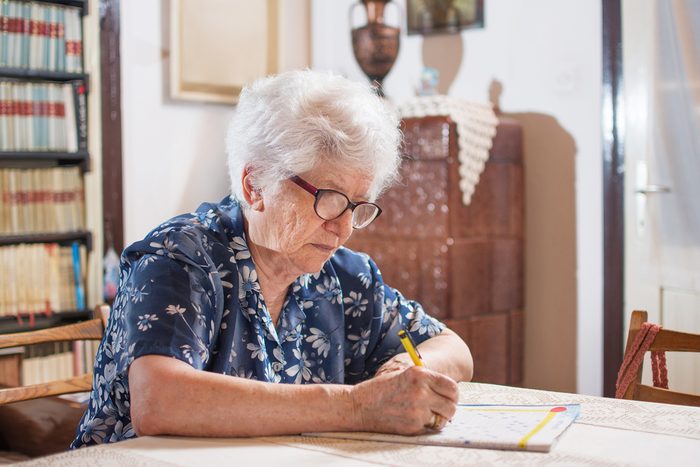
Look for wordplay
Crossword puzzles are a joy for those who like to think outside the box. You’ll need to regard clues from different angles. Stretch your mind to think through ambiguity as you consider the multiple ways that clues and answers can work. As Quigley explains, “you’ll see ‘drops on the ground’ and you’ll read it as a verb, when, in fact, it’s actually a noun and it’s a way for cluing ‘dew.'” Check out Reader’s Digest’s daily crossword puzzle.

Go ahead and Google
You can figure out a proper name or an obscure answer you don’t know by filling in the cross clues, but sometimes it’s easier to do a web search. Then you can drop the answer in, and move on from there, rather than struggling. Quigley says “for a beginner, there’s no problem with looking things up.” In his recommendation, doing a little bit of digging can improve your game long term. “The fact is,” Quigley says, “how do you expect to get better at anything if you don’t do some of the research?”
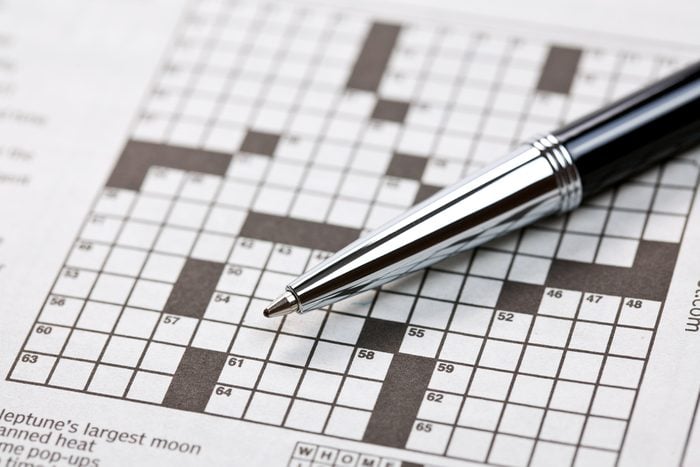
Walk away for a moment
“If you’re stuck, move on and do something else,” says Quigley. Crossword puzzles are meant to puzzle you. But as he puts it, “we want the solver to be able to figure it out.” The best puzzles will challenge you while still being doable and having answers that are gettable. It’s fine to put the crossword puzzle down or switch focus to a different corner. He offers that with a quick break, you allow yourself the space to see the answer, and often, once your return, “you can fly through the rest of it.”
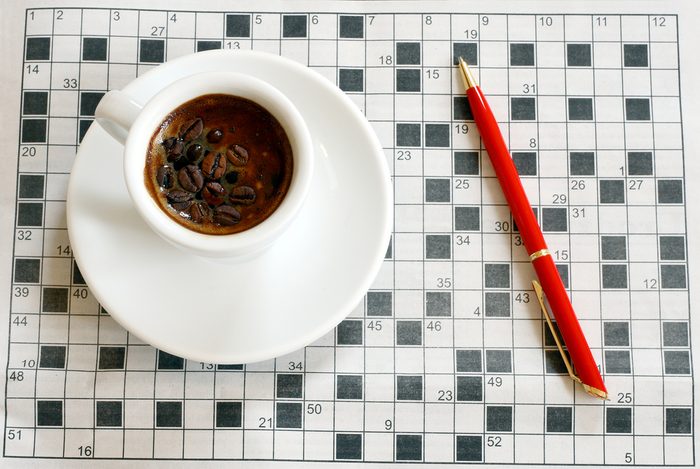
Relax and enjoy
Crossword puzzles are known for being challenging, and even frustrating. However, they’re the favorite pastime of so many of us because they’re so enjoyable. They’re relaxing—even when you’re stumped. Quigley notes, “it’s easy to make a hard puzzle.” But that’s not the point. Most crossword puzzle constructors know they’re constructing a puzzle that can be and will be cracked. Quigley says, “We want [solvers] to go, ‘Aren’t I clever for having solved this?’, not, ‘Man, the guy who made this is a real jerk.'” Solving a puzzle is a challenge, but it’s never a fight. Sit back, relax, and get ready to stretch your brain. Next, see if you can solve the most challenging riddles ever.
